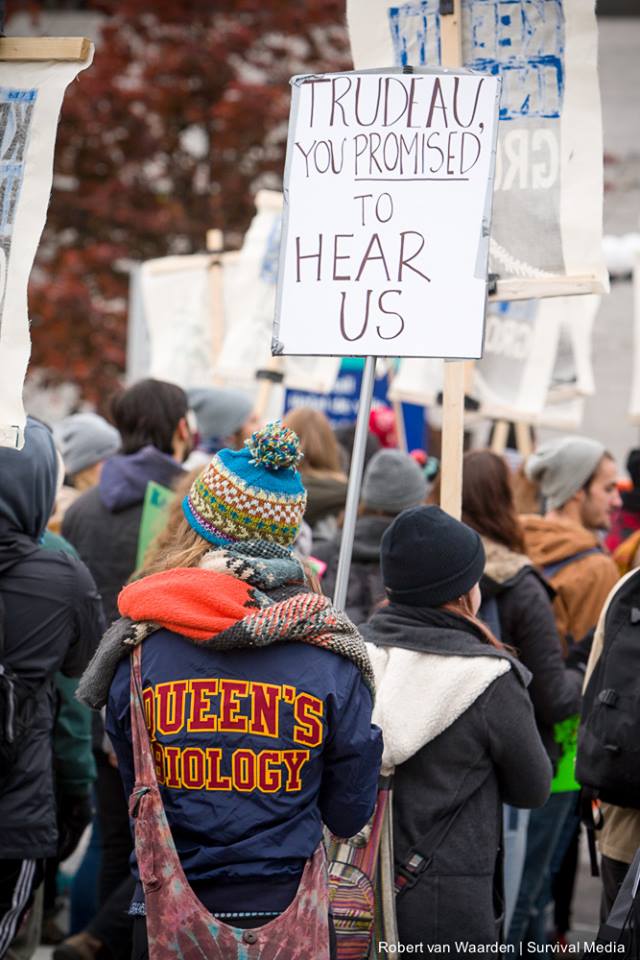
On Monday, 99 young people were briefly detained during a protest against pipeline expansion, taking place on Parliament Hill. Among them were two Queen’s students and one Queen’s alumni.
The three detained individuals had traveled to Ottawa with 18 individuals from Queen’s and the surrounding Kingston community, including 13 active students from the university.
The group arrived in Ottawa on Oct. 24 to protest the proposed Kinder Morgan expansion to the Trans Mountain pipeline, which spans from Alberta to the British Columbia coast.
Students involved described the event as a very polite affair as a whole. No one was criminally charged for their actions.

The arrests occurred when several of the protesters climbed over fences set up by police prior to the protest. The police warned them ahead of time they would be charged with criminal mischief. The participants explained they understood and wouldn’t resist arrest, then climbed over.
The rally was coordinated by 350.org, an environmental activist group that coordinates protests and other activist efforts globally.
Several of the Queen’s students present at the protest met with The Journal on Thursday to discuss the protest, their arrest and the realities of similar student activism.
According to Nick Lorraway, ArtSci ’20, they adamantly oppose the expansion due to the damage it has already done — and will continue to do — to the land in Alberta through oil spills.
He explained that the pipeline expansion would also disrupt Indigenous land.
According to Bea White, a third year exchange student from the communities to build pipelines on their land, the Indigenous population has no legal power to say no.
The current governmental process is more of a consultation than a legal request for permission.
To the students speaking to The Journal, the pipeline is not worth the price Canada would pay for it.
“The point of this expansion is not to meet the needs of our domestic energy — this [oil] is going to the coast to be shipped to China and elsewhere, but then the impacts are felt by the local community,” Diana Yoon, ArtSci ’17, said.
“So, who is this for, and why are we doing this?” she asked.
Prior to their protest, the group participated in five hours of civil disobedience training organized by 350.org. According to Yoon, the session was very well coordinated.
She explained that it covered everything from different examples of peaceful protest, to practicing simulations and role-playing interactions with the police.
The 350.org trainers emphasized they didn’t want anyone to be physically harmed or engage in conflict with the police, and granted them a spokesperson to address the media on their behalf and legal counsel to contact should they need it.

“It was very clear to us in the training that the protest is arrest,” Meila Lilles, ArtSci ’17, said. “The protest was for us to get arrested, because we wanted to use that tactic of breaking the law to get our voices heard.”
White and another exchange student, Charlotte Oeh, avoided arrest due to how a criminal charge might affect their ability to travel or live in Canada. Lilles said this fear brought to light the reality of many marginalized groups, who find it too risky to participate in these sorts of protests.
“For those who really cannot risk [arrest], like immigrants or non-status people, what does that say about their voices? How does that marginalize their own political identity?” Lilles asked.
Yoon said that those who chose to climb over the fence, including herself, were given a citation indicating they were banned from visiting Parliament Hill for the next three months. If they were found on the premises, they would be criminally charged.
They were pleased with the resulting media attention and the interest received from the Queen’s community. CBC cited the protest organizers, calling it the largest act of student climate civil disobedience in Canadian history.
“It’s about getting off the couch and actually doing something more than anything,” Lorraway said. “I’d do it again.”

Tags
350 Canada, arrests, indigenous affairs, Justin Trudeau, Parliament Hill, pipeline, Protest, QBACC
All final editorial decisions are made by the Editor(s)-in-Chief and/or the Managing Editor. Authors should not be contacted, targeted, or harassed under any circumstances. If you have any grievances with this article, please direct your comments to journal_editors@ams.queensu.ca.
